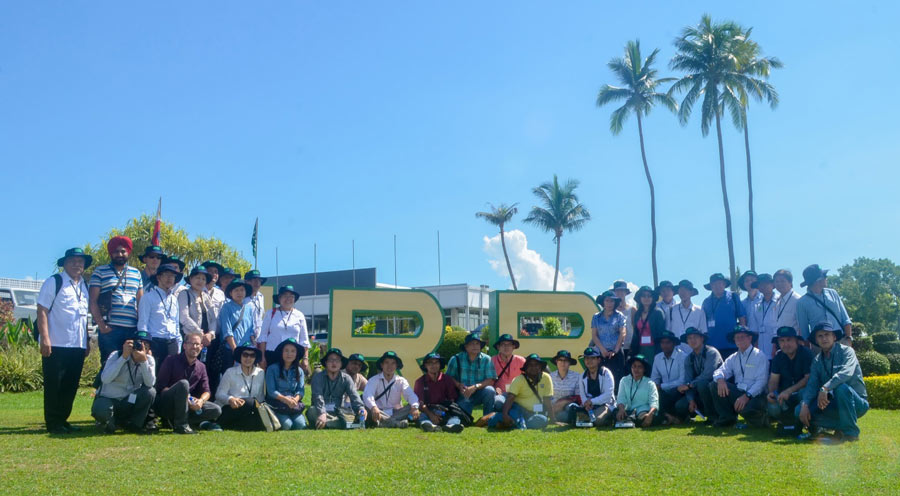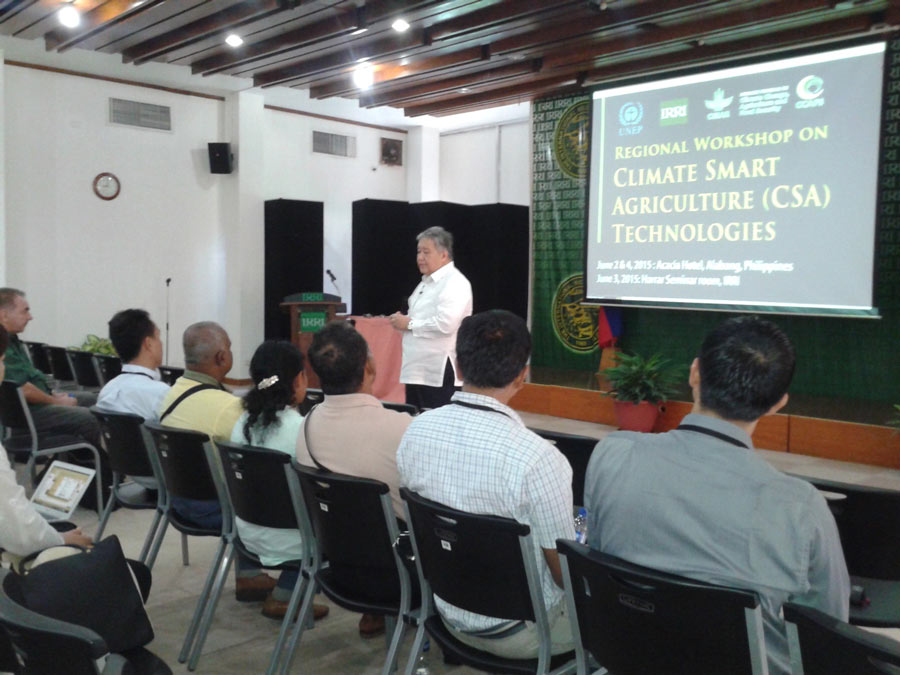The event was organized by the International Rice Research Institute (IRRI)-CGIAR Research Program on Climate Change, Agriculture and Food Security (CCAFS) and sponsored by the UNEP which also hosts the Climate Technology Centre and Network (CTCN). CTCN promotes the accelerated transfer of environmentally sound technologies for low carbon and climate resilient development at the request of developing countries. The network delivers technology solutions, capacity building and advice on policy, legal and regulatory frameworks tailored to the needs of individual countries.
Representatives from the agriculture and environment ministries in 16 participating countries (South Asia, Southeast Asia, Central Asia, and East Asia), pool of scientists from various CGIAR centers and research programs, financing institutions and regional and national organizations were gathered to discuss opportunities and possible collaboration towards CSA. One of the key outputs of the workshop was to develop concept notes that will underscore the support needed by participating countries in the areas of technical assistance, financing, and support services for upscaling and out-scaling CSA.
The CSA approach, according to Food and Agriculture Organization (FAO) aims at building resilience against climate change and variability through these measures: a) addressing adaptation and climate change mitigation as potential co-benefit; b) being location-specific and knowledge intensive; c) identifying integrated options that create synergies and reduce trade-offs; d) identifying barriers to adoption and providing appropriate solutions; e) strengthening livelihoods by improving access to services, knowledge and resources; and f) integrating climate financing with traditional sources of agricultural investments.
After the CGIAR centers showcased hardcore technologies like weather information and forecasting, alternative wetting and drying (AWD) for rice, and water stress management, among others; each country representative was able to present its initial CSA needs and identify the kind of technical assistance that they will be requesting to the CTCN. A more detailed definition of roles (e.g. national, CGIAR, funding agency), technical needs, geographic focus, etc. are to be specified in the concept note.
On the last day of the workshop, four themes surfaced during the discussion of the CSA needs of each country. Specifically, the participants identified the following: a) issues on the access to specific and needs-based technologies; b) out-scaling and upscaling of CSA technologies; c) policy advice and proper framing of national strategies and mainstreaming mechanisms; and d) crop suitability mapping and modelling.
Dr. Reiner Wassmann, Coordinator for Climate Change Research at IRRI gave his impression that the plans presented are still very broad and scattered. He emphasized the need to focus on the “low-hanging fruits” where there are synergies on development. He also suggested prioritizing the identified common themes with consideration on what is doable on a specific timeframe and what technologies are already proven.
Moreover, Dr. Leocadio Sebastian, Regional Program Leader for CCAFS South East Asia also highlighted that it is essential to support country-specific problems, to produce more localized evidences of learnings and successes and to continue capacity building efforts especially with the national partners.
Everyone in the workshop acknowledged that the detrimental effects brought about by climate change and variability should be addressed in a more “integrated” manner. Hence, there is a strong call to collective action from the government, research institutions and its programs, development organizations and funding agencies to develop a more sustainable climate-smart agriculture.

The 16-country delegation together with representatives and scientists from CGIAR centers, development, regional and national organizations visit IRRI to learn CSA technologies in rice systems. (Photo by: IRRI-CCAFS)
What CIP has to offer?
The International Potato Center (CIP) has an impressive portfolio of technologies and approaches that are integrated with its current programs and projects across the Asia Pacific region.
CGIAR Research Program on Roots, Tubers and Bananas
CIP works closely with other research centers to ensure that climate-proofing measures are being done across the value chain. CIP leads the CGIAR Research Program on Roots, Tubers and Bananas (RTB) together with its partners Bioversity International, International Center for Tropical Agriculture (CIAT), International Institute of Tropical Agriculture (IITA) and the French Agricultural Research Centre for International Development (CIRAD).
The RTB program “breeds for higher nutritional and processing quality and adaptation to stressful environments, facilitates access to improved quality planting materials and provides better management practices that address these challenges. A combination of dynamic conservation and on-farm use of crop genetic diversity can ensure resilient cropping systems and capacity to respond to evolving stresses. Methods to help poor farmers’ access higher value markets for fresh or processed RTB can strengthen capacities, increase incomes and improve livelihoods.”
Farmer Business School (FBS) Approach
In Asia, the International Fund for Agricultural Development (IFAD)-funded program on Food Security Through Asian Roots and Tubers (FoodSTART) was able to adapt the Farmer Business School (FBS) approach from Indonesia to the Cordillera, Philippines. FBS is an action learning approach that supports the farmer groups’ participation in and benefits from agricultural value chains.
The FBS curriculum is guided by value chain framework with activities over a production-marketing cycle while interacting with chain actors and stakeholders. This approach envisages more profitable pro-poor farm businesses through market-oriented innovations that enhance trust and coordination, collaboration between farmers and chain actors while empowering men and women farmers, and thus contributing to sustainable livelihoods of RTC and non-RTC farming households.
Furthermore, the curriculum has evolved from addressing the value chain capacity building needs of an IFAD-supported Second Cordillera Highland Agricultural Resource Management Program (CHARMP2) to a more straightforward “climate-smart” and “gender-responsive” curriculum which targets local communities that are more vulnerable to hazards brought about by climate change.
Experiences in FBS applications across Southeast Asia have increasingly stressed the need to address climate change risks in promoting farmer business development, including: a) local adaptation strategies to ensure sustained crop production for markets, b) targeting of and investment planning for agricultural value chains guided by long-term scenarios for climate change impact; and c) vulnerability analysis as part of business planning among micro- and small agricultural enterprises.
RTC strengthens resilience to food security
Root and tuber crops, with reference to sweetpotato, have proven its nutritional value and resiliency especially for disaster recovery initiatives. In the Philippines, Typhoon “Haiyan”, the strongest tropical cyclone recorded to hit the country left with some 6,300 deaths and around 700 million USD worth of damage to the agriculture sector.
Eastern Visayas, the home of CIP’s national program partner Visayas State University – Philippine Root Crops Research and Training Center (VSU-PhilRootcrops) was heavily stricken. PhilRootcrops led the short-term response activities to those affected communities in the province. Beneath the fallen coconut trees or in open fields and slopes, local farmers noticed that few of the crops that survived the storm include sweetpotatoes. Communities with fresh roots available did not have severe food crises as those without. Sweetpotato served as the local food supply until the relief efforts arrived.

Dr. Bruce Tolentino, Deputy Director General for Communication and Partnerships of IRRI gladly receives the multi-country delegation of the CSA technologies workshop (Photo by: IRRI-CCAFS)
References and Useful links:
Climate Technology Centre & Network: http://ctc-n.org/
CGIAR Research Program on Roots, Tubers and Bananas: http://www.rtb.cgiar.org/
Food Security Through Asian Roots and Tubers Project: http://asia.ifad.org/web/foodstart
International Potato Center: https://cipotato.org
For clarification or additional information on this article, kindly send an e-mail to Angelica Barlis, Communication Specialist of CIP-FoodSTART at a.barlis@cgiar.org.
